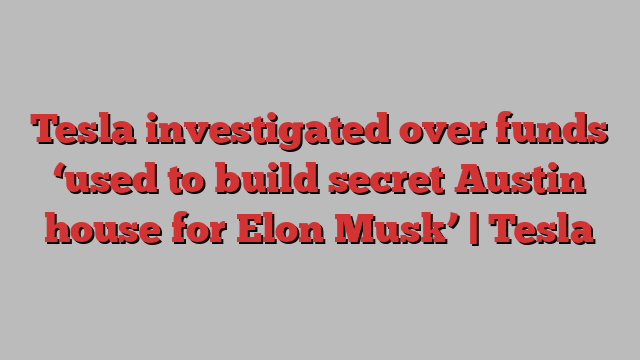
US prosecutors are investigating Tesla over alleged use of company funds for a secret project described internally as a house for Elon Musk, the electric carmaker’s chief executive.
Information sought from Tesla by the US attorney’s office for the southern district of New York includes personal benefits paid to Musk, how much was spent on the project and its purpose, according to the Wall Street Journal.
The report, citing sources familiar with the matter, added that the Securities and Exchange Commission, the US financial regulator, had also opened a civil investigation into the project, which was known as “Project 42” internally.
According to a WSJ report in July, plans for “Project 42” resembled Apple’s store at Fifth Avenue in Manhattan, New York, and took the shape of a twisted hexagon on waterfront land with Tesla’s Austin factory behind it. The WSJ said the proposed building at the Texas headquarters had been described as a house for Musk.
Other images of the project showed a large glass box that appeared to include a residential element, the WSJ reported. It said Tesla lawyers and board members had looked at the project after employees raised concerns about how a multimillion dollar order for glass was going to be used.
The status of the project and the order for the glass was unknown, the WSJ said, adding that the investigations were in their early stages and may not lead to charges.
Tesla, Musk and the Manhattan US attorney’s office have been contacted for comment. The SEC declined to comment.
In March the WSJ also reported that Musk was planning to build a “sort of Texas utopia” outside Austin, near facilities for his Boring tunnelling company and his SpaceX rocket company, where his employees could live and work.
The WSJ also reported on Wednesday that federal prosecutors were looking into Tesla claims about vehicle performance after a report that the company exaggerated the potential driving distance of its cars.
Reuters reported in July that Tesla cars often failed to achieve their advertised range estimates and projections reported by the cars’ own equipment, citing experts who tested or studied them. The company wrote algorithms about a decade ago to create “rosy” in-dash driving range estimates, Reuters reported a source as saying, and set up a “diversion team” to cancel range-related service appointments.
The carmaker deployed the team because its service centres were inundated with appointments from owners who had expected better performance based on the company’s advertised estimates and the projections displayed by the in-dash range meters of the cars themselves, reported Reuters, citing people familiar with the matter.